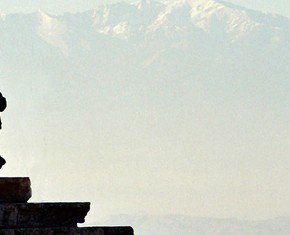The views expressed in our content reflect individual perspectives and do not represent the authoritative views of the Baha'i Faith.
We constantly face difficult decisions about what is right and wrong. “Should I pretend that I like her new dress?” “Do I really need to include this on my tax return?” or “I love the taste of meat, but should I be eating it every day of the week?”
Three main ethical frameworks are usually put forward to deal with such conscience-gripping dilemmas that focus on: virtue, duty, and outcomes.
These three approaches have often been considered contradictory to one another. But the Baha’i teachings show us how they can complement each other and help us face ethical issues with clarity and confidence.
Virtue
Virtue is often the last approach discussed when presenting these three ethical frameworks. However, in the Baha’i Faith, it is the most conspicuous of the three. In fact, at a glance, it may seem that the Baha’i teachings only utilize this approach to ethical issues. There are numerous writings about the meaning and importance of virtues. Here is just one by Abdu’l-Baha, the son of the prophet and founder of the Baha’i Faith, Baha’u’llah, and his designated successor:
We must strive with energies of heart, soul and mind to develop and manifest the perfections and virtues latent within the realities of the phenomenal world, for the human reality may be compared to a seed. If we sow the seed, a mighty tree appears from it.
Like other virtue theories, such as Aristotle’s, the Baha’i writings emphasize the power of these positive qualities to shape our lives. These qualities enable us to make the right decision by applying the appropriate virtue. For instance, if we have to decide between making a lot of money by lying or not, we call on the virtue of truthfulness to guide us toward the best course of action: telling the truth.
RELATED: Aristotle’s Golden Mean and the Role of Moderation
But how do we make these noble decisions if we ourselves are imperfect?
Good question! Well, Aristotle suggested that we adopt a role model. That way, we can gradually become more and more virtuous and can hence make better decisions and live a more noble life. This is very much in line with the Baha’i teachings, which highlight the importance of aligning our lives with the teachings and examples of the Manifestations of God. These spiritual leaders, which include figures such as the Buddha, Christ, Muhammad, and most recently Baha’u’llah, perfectly mirror all the virtues of God. This means that by following their example and putting their teachings into practice, we develop the same noble qualities that help guide our actions. Not only do these virtues help us to live a noble life, but as Aristotle expounded, they also bring us happiness.
Duty
While virtue is of clear importance in the Baha’i way of life, there is also an emphasis on duty. Unlike virtue’s fluid approach to ethics, a focus on duty is more clear-cut. Virtues can be enacted in different ways across cultures and between individuals; duties are more set in stone.
The philosopher who is known most for his emphasis on duty is Emmanuel Kant. (Note that he was not named after the duties he set out: e.g. “You can’t do this… and you can’t do that…) Kant held that these duties were based on reason and centered around being able to universalize action that did not treat others as things to use for one’s own benefit.
RELATED: What’s the Difference Between a Prophet and a Philosopher?
We could say that Kant’s notion of duty provides a rational explanation for the application of virtues. For instance, the Baha’i writings say: “truthfulness is the foundation of all human virtues.” Kant provided a rational justification for this virtue. He said that it was wrong to lie because it would be logically inconsistent for everyone to be free to lie and still be able to distinguish truth from falsehood.
The Baha’i teachings outline certain duties, such as parents’ obligation to educate their children. For example, Abdu’l-Baha wrote:
… education and training are recorded in the Book of God as obligatory and not voluntary. That is, it is enjoined upon the father and mother, as a duty, to strive with all effort to train the daughter and the son, to nurse them from the breast of knowledge and to rear them in the bosom of sciences and arts.
Furthermore, in circumstances where parents cannot provide an education for more than one child, they must educate their daughter, since she is likely to raise her own children and educate them. This approach is now also recognized by the United Nations and NGOs around the world. There are numerous initiatives worldwide to educate girls because it’s understood that this has positive and far-reaching social and environmental effects.
But from a Baha’i perspective, what we can see here is that this duty to educate, and educate women, in particular, is not a duty drawn out of thin air — it is derived from virtues. In this particular duty, we see the virtue of knowledge, because children learn about the world and through scientific and rational means approach the truth about it. We can also see excellence, since it encourages children to learn various branches of knowledge and arts to a high standard, and justice, as it increases the opportunities of women, who have been historically disenfranchised.
Outcomes
There is another approach to ethics that emphasizes a different side to ethical issues: their outcomes.
This approach is often called “consequentialism” because it focuses on the consequences of people’s actions. There are many versions of this theory, but what is basically the same across all of them is that what makes an action ethically justified is its intention to produce the greatest good for the greatest number of people.
One common example is that if there was a train track that split off into two rails, and there was a group of 20 people tied to one track and two people tied to the other, the ethical thing to do would be to divert the train to the track with the two people so that more people would survive. (Such dilemmas get more difficult when we imagine that the two people are our loved ones!)
Though the Baha’i teachings do not formally side with this approach to ethics, we can nonetheless see the presence of this perspective in the Baha’i writings, through injunctions like this one that call us to focus on benefiting all of humanity:
This is worship: to serve mankind and to minister to the needs of the people. Service is prayer. A physician ministering to the sick, gently, tenderly, free from prejudice and believing in the solidarity of the human race, he is giving praise.
We could say that we can often test whether a decision or action is ethical by asking ourselves, “will this course of action benefit the most people possible, or will it mainly benefit me?” If it will benefit the most people possible, then it’s probably the most virtuous course of action.
That said, we also have to factor our own well-being into the equation and decipher needs from wants. If my actions will enable a lot of people to attain some fickle and fleeting pleasure at the expense of my own physical or mental wellbeing, then that is probably not the best thing. Clearly, if I diminish my own well-being, I will be less able to be of real help to others.
We can face ethical dilemmas from the perspectives of virtue, duty, and outcomes. And while we sometimes don’t have time to analyze every decision, when faced with fork-in-the-road moments, we can ask ourselves the following questions:
“What virtues would I embody if I do this?”
“Would I uphold my duty to my mother, wife, friend, or colleague?”
“Would this meaningfully benefit the most people possible?”
By asking these questions, we can look at the issue from different angles, check our motivation, and see the potential impact of our actions. This means that we have a better chance of making decisions that we can be sure of in the present and proud of in the future.
















Comments
Sign in or create an account
Continue with Googleor